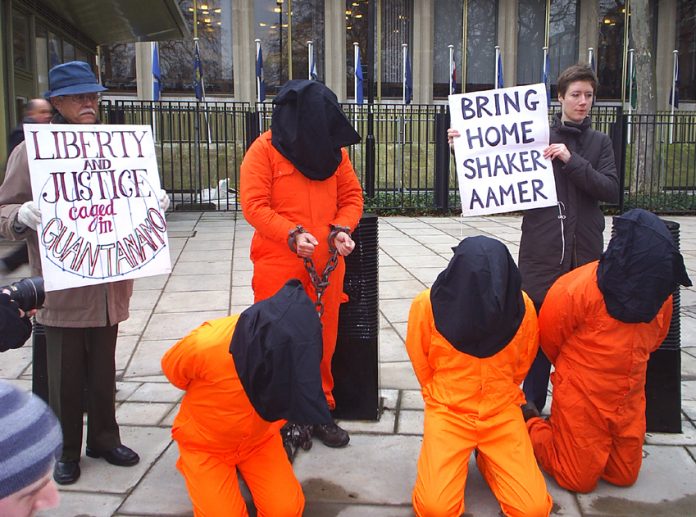DOCTORS, psychologists and behavioural consultants working with the US Department of Defence-CIA have concealed evidence of torture.
Hippocratic or hypocritical oath?
US Department of Defence doctors and psychologists whose duty was to care for inmates at Guantanamo Bay, Cuba, concealed evidence of intentional harm and torture, said a study on Tuesday.
In the peer-reviewed journal PloS Medicine, come in the wake of a host of secret US documents released by Wikileaks, shedding light on conditions in the US military prison in Cuba.
Co-authored by a retired army brigadier general and an expert with Physicians for Human Rights, the study is based on the medical records and legal files of nine inmates at the US ‘war on terror’ prison.
The authors call into question whether military doctors, who like their civilian colleagues generally adhere to the Hippocratic Oath to do no harm, should have done more when confronted with potential of abuse or torture.
The Department of Defence did not immediately respond to a request for comment.
Military doctors noted the sudden onset of post-traumatic stress symptoms in some inmates who had no history of mental problems, heard stories of rape and documented bone fractures, contusions and lacerations, but they did not question the cause, the study said.
‘The medical doctors and mental health personnel who treated the detainees…failed to inquire and/or document causes of the physical injuries and psychological symptoms they observed,’ it said.
In one case, a clinician with the Defence Department’s behavioural health service noted a detainee’s suicidal thoughts, memory lapses and nightmares, and prescribed anti-depressants.
‘(You)…need to relax when the guards are being more aggressive,’ the inmate was told, according to medical records cited by the study.
Reports of alleged complicity by CIA doctors and psychologists and DoD behavioural consultants, described by the US government as ‘non-clinical’ experts who were present during the so-called enhanced interrogation techniques such as waterboarding, have already come to light.
But according to lead author Vincent Iacopino, this study focuses on Defence Department medical personnel – doctors and psychologists – who directly cared for Guantanamo inmates and whose role has been largely obscured.
‘There has been no information to date on the role of those health professionals in turning a blind eye, as the paper has indicated, until this time,’ Iacopino said.
The study does not name the clinicians involved. Iacopino said the doctors’ names had been redacted from the documents they consulted, but would be available to those with classified access.
The team of non-governmental medical experts that reviewed the files also admitted facing obstacles in reporting the full extent of what happened.
‘Nearly all’ of the doctor visits ‘were initiated after suicide attempts and/or detainee hunger strikes’, and notes taken by military doctors ‘indicate that their visits were unwelcome and the detainees often refused to cooperate’, said the study.
Some medical records were heavily edited by military censors, and since the study is limited to nine cases, it is difficult to extrapolate the findings or allege that similar treatment happened to other detainees.
‘Nevertheless, these findings reveal new information about the potential extent of medical complicity in US torture practices, and they highlight the need for a thorough and impartial investigation of all the available information, including relevant classified information,’ the study said.
‘The commission and/or concealment of acts of torture should never be justified by any health professionals – clinical, non-clinical, military, or non-military.’
l Meanwhile, the Bush-era CIA chief has hailed the past cooperation of Libyan and Syrian leaders, and says their downfall could complicate US interests.
Retired general Michael Hayden, who led the Central Intelligence Agency from 2006 to 2009 under President George W Bush, said that restive Syria also helped US intelligence but only in selective areas.
Speaking at a conference of the Marine Corps University, Hayden said the CIA had worked well with Gadaffi and Mussa Kussa, the foreign minister who defected last month as Libyan forces moved against rebels.
‘Whatever you think of Gadaffi and Mussa Kussa…they were good and they were good counter-terrorism partners,’ Hayden told the conference near Washington.
Hayden said Syrian President Bashar al-Assad was ‘pretty good’ at fighting Sunni Muslim militants but supported Shi’ite radicals.
Assad belongs to the Alawite sect, a Shi’ite offshoot despised by Sunni extremists such as Al-Qaeda.
‘In both cases, you have real near-term turbulence that could – that will – make the closer fight in the immediate time-frame much more difficult,’ Hayden said.
But Hayden said the wave of unrest across the Arab world could prove beneficial to the United States in the long term by changing the dynamics of the region.
The uprisings ‘will make the ground far less fertile for the type of extremism that Al-Qaeda proselytises, but it’s a long time between here and there,’ Hayden said.
Gadaffi, a long-time international pariah due to the 1988 Lockerbie bombing and other attacks blamed on Libyan spies, started to reconcile with the United States in 2003 and found common interest in fighting Al-Qaeda.
But Western powers led by France and Britain launched air strikes on Gadaffi’s forces last month to try to opportunistically grab Libya’s oil in a major about-turn in imperialist policy.
Syria, meanwhile, on Tuesday bolstered troops around the flashpoint town of Deraa, triggering calls for a foreign intervention.
A Syrian rights group said the crackdown has killed 400 people since mid-March.
Hayden also voiced concern about Yemen, a frontline in the US-backed campaign against Al-Qaeda.
President Ali Abdullah Saleh, a key US partner who has been in power for 30 years, has agreed to a plan to step down.
‘I would never claim that President Saleh was, kind of, an easy fit as a partner with regard to anything. But I don’t know what’s on the next page,’ Hayden said.
‘Now you’ve got the Yemeni government at best distracted and perhaps worse,’ he said.
